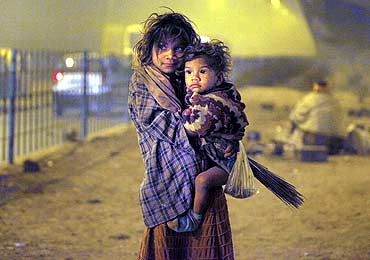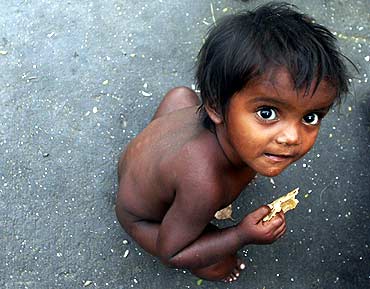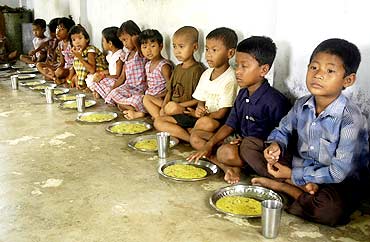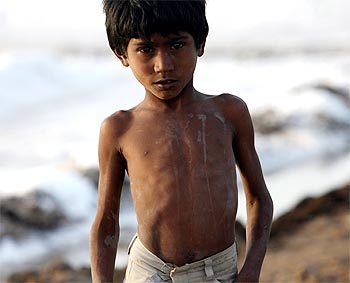 | « Back to article | Print this article |
Booming economy not helping our malnourished kids: Study
India's impressive economic growth has not led to a reduction in under-nutrition among its children, according to a Harvard study that said the government should use its growing revenues for direct investments in aid like food stamps to address the problem.
The Harvard School of Public Health study analysed malnutrition across various regions in India. It said under-nutrition was worst in poor and populous states like Bihar, Madhya Pradesh and Uttar Pradesh.
It was less common in north-eastern states like Mizoram and Manipur, and also in Kerala.
'Growth has not ended under-nutrition among children'
"Growth in India's economy since the early 1990s has not ended under-nutrition among children in that country and may require the Indian government to directly invest in appropriate health interventions such as food aid," said the study, which was conducted by HSPH Associate Professor of Society, Human Development and Health, S V Subramanian.
The study analysed economic and children's growth patterns from data based on the National Family Health Surveys on 77,326 Indian children in 1992-93, 1998-99 and 2005-06. The study said India is not on track for achieving the target for Millennium Development Goal of reducing child mortality.
'Growth has no automatic connection to reducing under-nutrition'
Given that under-nutrition between 6 and 59 months of age contributes to about 25-50 per cent of the mortality in that age group, reducing under-nutrition is imperative to achieving these goals, the study said.
"The null association between state economic growth and under-nutrition among children observed suggests that the role of economic growth and, more broadly, growth-mediated strategy in achieving the MDGs needs to be reappraised. The findings suggest that economic growth has no automatic connection to reducing childhood under-nutrition," it said.
While the researchers found that the prevalence of under-nutrition had decreased slightly during the study period, the decline did not correspond with the increase in economic growth.
'Use growing tax revenues for direct aid'
The authors said an explanation to the trend is that India's rapid economic growth "may have benefited only the privileged sections of society."
Economic growth in India is largely driven by the service and technology sector, benefiting mostly the 'privileged section' of the country. However, majority of the population is engaged in farming or manufacturing.
"It may, therefore, require India's government to use its growing tax revenues for direct aid like food or food stamps in order to substantially reduce child under-nutrition," Subramanian said.
Booming economy not helping our malnourished kids: Study
Other studies have shown that educating women and reducing birth rates do more to keep children fed than macroeconomic growth, said the study, which Subramanian co-authored with Malavika Subramanyam, postdoctoral fellow at the School of Public Health at the University of Michigan.
The children's nutritional status was classified as underweight or stunting and wasting, based on the World Health Organisation Child Growth Standards.




